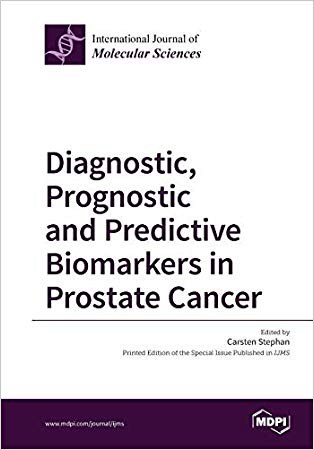 Prostate cancer is the most common cancer in men in the Western world. Therefore, its early diagnosis in particular, which is mainly based on serum prostate-specific antigen (PSA), has gained attention in several fields of research. New biomarkers in serum and urine have been described, for example, the prostate health index (PHI) or urinary Prostate cancer gene 3 (PCA3), or others including several biomarker-based multivariate models. In addition to three studies and two reviews regarding PHI and other markers within this Special Issue ?Diagnostic, Prognostic and Predictive Biomarkers in Prostate Cancer?, new immunoassays with the PCa-associated aberrant glycosylation of PSA (S2,3PSA) have been published. However, it is important to know not only the diagnosis, but also the prognosis or further prediction of this very common disease. Here, several new nucleic acid or protein-based tissue biomarkers have been described. Most studies in this Special Issue used tissue microarrays and immunohistochemistry. As already described for other types of cancer, individualized medicine, such as theranostics, a combinati
Prostate cancer is the most common cancer in men in the Western world. Therefore, its early diagnosis in particular, which is mainly based on serum prostate-specific antigen (PSA), has gained attention in several fields of research. New biomarkers in serum and urine have been described, for example, the prostate health index (PHI) or urinary Prostate cancer gene 3 (PCA3), or others including several biomarker-based multivariate models. In addition to three studies and two reviews regarding PHI and other markers within this Special Issue ?Diagnostic, Prognostic and Predictive Biomarkers in Prostate Cancer?, new immunoassays with the PCa-associated aberrant glycosylation of PSA (S2,3PSA) have been published. However, it is important to know not only the diagnosis, but also the prognosis or further prediction of this very common disease. Here, several new nucleic acid or protein-based tissue biomarkers have been described. Most studies in this Special Issue used tissue microarrays and immunohistochemistry. As already described for other types of cancer, individualized medicine, such as theranostics, a combinati
 Prostate cancer is the most common cancer in men in the Western world. Therefore, its early diagnosis in particular, which is mainly based on serum prostate-specific antigen (PSA), has gained attention in several fields of research. New biomarkers in serum and urine have been described, for example, the prostate health index (PHI) or urinary Prostate cancer gene 3 (PCA3), or others including several biomarker-based multivariate models. In addition to three studies and two reviews regarding PHI and other markers within this Special Issue ?Diagnostic, Prognostic and Predictive Biomarkers in Prostate Cancer?, new immunoassays with the PCa-associated aberrant glycosylation of PSA (S2,3PSA) have been published. However, it is important to know not only the diagnosis, but also the prognosis or further prediction of this very common disease. Here, several new nucleic acid or protein-based tissue biomarkers have been described. Most studies in this Special Issue used tissue microarrays and immunohistochemistry. As already described for other types of cancer, individualized medicine, such as theranostics, a combinati
Prostate cancer is the most common cancer in men in the Western world. Therefore, its early diagnosis in particular, which is mainly based on serum prostate-specific antigen (PSA), has gained attention in several fields of research. New biomarkers in serum and urine have been described, for example, the prostate health index (PHI) or urinary Prostate cancer gene 3 (PCA3), or others including several biomarker-based multivariate models. In addition to three studies and two reviews regarding PHI and other markers within this Special Issue ?Diagnostic, Prognostic and Predictive Biomarkers in Prostate Cancer?, new immunoassays with the PCa-associated aberrant glycosylation of PSA (S2,3PSA) have been published. However, it is important to know not only the diagnosis, but also the prognosis or further prediction of this very common disease. Here, several new nucleic acid or protein-based tissue biomarkers have been described. Most studies in this Special Issue used tissue microarrays and immunohistochemistry. As already described for other types of cancer, individualized medicine, such as theranostics, a combinati